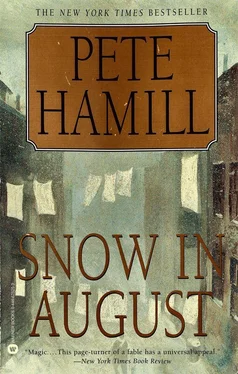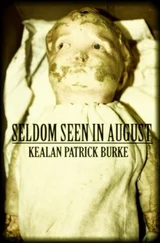Finally they came to a large room with glistening stone walls, filled with rotting tables, cobwebbed pots, beakers, tubes: the abandoned workshop of an alchemist. Rabbi Loew felt a chill that would remain with him the rest of his life. Even now, more than four hundred years later, it seeped into Michael.
And then the Golem became excited, growling, alert, his nose flaring. He made his way into a dark corner. He returned with two baskets. They were not draped in cobwebs. In one of them, Rabbi Loew found almost thirty vials filled with fresh human blood. Each was labeled with the name of a well-known Jew. In the other, wrapped in a Jewish prayer shawl called a tallis , was the body of a child.
“Right away,” Rabbi Hirsch whispered, “he knows the plot.”
It was obvious: just before Passover, Brother Thaddeus would have the body and the vials of blood moved through the tunnels to the cellar of the Old-New Synagogue. From there, under cover of night, his henchmen would plant the vials throughout the Jewish Quarter, and the child’s body in Rabbi Loew’s own house. Brother Thaddeus could then bring the police to discover them and “prove” that the Jews were engaging in human sacrifice.
A blood libel!
Rabbi Loew acted quickly. He told the Golem to carry the child’s body back through the tunnels and hide it in the wine cellar of Brother Thaddeus’s mansion. The Golem smiled and went away with the body, while Rabbi Loew prayed for the child’s soul. When the Golem returned, Rabbi Loew ordered him to dig a deep hole in the earthen floor and bury the vials of blood. The Golem did what he was told, covering the holes with dirt, stones, and smashed beams. Then they retraced their steps. They noticed something new: the squealing of the rats had ended.
The next morning — it was the day before Passover — the police began raiding houses all over the Jewish Quarter, using a list of names from Brother Thaddeus. Michael watched them arrive in horse-drawn carriages outside the house of Rabbi Loew, two detectives in plain clothes, one tall and gray, the other short, fat, and flushed. More than thirty uniformed policemen were behind them on horseback. And then a gloating Brother Thaddeus arrived in his own fine carriage, his leather boots clacking on the cobblestones.
The police found nothing. Brother Thaddeus was stunned. As he marched with the police past the ruins of the Fifth Palace, he suggested to the detectives that they search the cellars of the ruined palace and the nearby Old-New Synagogue. He reminded them that there were always rumors of secret tunnels.
The detectives did what he asked, and for hours they searched. They found nothing. Michael saw Brother Thaddeus grow pale. Beads of sweat appeared on his bald head. He blinked his hairless eyelids and scurried away, in search of his henchmen, to find out what had gone wrong. But, fearful of his rage, they had vanished into the hills when they realized the blood was missing.
And so the eight days of Passover ended without the planned pogrom. And then it was Easter. Brother Thaddeus invited all the most important people in Prague to a lavish banquet, including the mayor and the chief of police, who brought his detectives as bodyguards. They were all assembled at table when Brother Thaddeus sent a servant to the wine cellar to bring up some of the oldest and finest bottles. After a few minutes, the servant returned, his eyes wide with horror.
“She’s there!” he exclaimed. “There — in the cellar!”
Pandemonium!
All rushed to the wine cellar, except Brother Thaddeus.
When they returned, the police chief was carrying the dead baby. Michael saw its face, as white as flour. The detectives glanced at each other and then at Brother Thaddeus. The monk backed into a corner like a trapped animal. The mayor said: “It was you.” And Brother Thaddeus began to weep.
There was a long silence in the basement of the Brooklyn synagogue.
“Did they hang him?” Michael said. “Chop his head off?”
“No. Him, they didn’t need to make a martyr, and Rabbi Loew agreed. So Brother Thaddeus was sent to prison for twelve years. He died there, blaming the Jews.”
“And what happened to the Golem?”
“He — well, it’s another story. And sad. Because it is a love story. And all love stories are sad.”
For a moment, Michael Devlin saw his mother and father together, dancing slowly, like a couple in a sad movie. He in an army uniform, she in a gown. Dancing in marble halls. Rabbi Hirsch stared at his own fingers, and for the first time Michael noticed that he was wearing a wedding band on the third finger of his left hand.
“The problem is simple,” the rabbi said. “The Golem is made of mud, yes. He is very large, yes. Very strong, yes. He can’t speak and he have to obey every order from Rabbi Loew. But he also have his own thinking, does his own plans. Worse, worse — he have the feelings of a human being.” He paused. “And after Brother Thaddeus is put in jail, after the great danger to the Jews is over — for a little while anyway — Rabbi Loew takes it easy. And so does the Golem. He looks so normal, gardening and that kind of stuff, Rabbi Loew even gives him a name: Yossel. Like Joseph. Joseph Golem.”
In his relaxation, Joseph Golem began to notice a young woman named Dvorele. She was an orphan. Her family had been destroyed by Brother Thaddeus’s followers, their house burned in one of those fires that had leveled so many Jewish homes in the countryside. After months of wandering, she had found refuge in the household of Rabbi Loew. There, she worked in the kitchen under the supervision of the rabbi’s wife, Pearl. She helped clean the rooms. She did laundry. She began to learn how to read and write. Michael could see her clearly: small and dark, with huge brown eyes, like Rosalie Caputo in the sixth grade at Sacred Heart, and speaking very little, as if still paralyzed by the horror that had taken the lives of her parents, her three brothers and two sisters.
“Joseph Golem watches her,” Rabbi Hirsch said, “and helps her with work, and soon — too bad! — love comes up in his heart.”
Michael thought of Boris Karloff in the Frankenstein movie, playing with the flowers and the little girl beside the lake. He saw the Golem trying to explain what he felt to Dvorele, how he tried to get her to sense the great stirring within his heart. But he couldn’t speak. He rolled his eyes. He looked sad. He put his hands to his forehead. He pointed at his heart and then at Dvorele, trying to make her understand. But she shied away from him, busying herself with peeling potatoes or dusting the bookshelves in Rabbi Loew’s study. Joseph Golem pined for her. At night, lying on his eight-foot cot in his cellar room, he sometimes wept.
One cold night, Rabbi Loew heard the great heaving sobs of Joseph Golem. He rose from his bed, lit a candle, and went down to visit the creature. At the sight of the Golem, turning and twisting in his bed, his teeth grinding and his hands kneading each other, the rabbi felt a great pity.
“Joseph Golem needs to say the words,” Rabbi Hirsch said, “but he does not have language. Not Yiddish. Not Hebrew. Not German. Not Czech. And love, it’s almost always about words.”
That night, Rabbi Loew comforted the giant Golem, whispering prayers, soothing his addled heart. Finally, Joseph Golem fell into a deep sleep. Rabbi Loew stared at him for a long time before returning to his own bed.
“He is thinking, time is short for this poor fellow,” Rabbi Hirsch said. “He needs to pray to find out what to do.”
But the next day, Rabbi Loew had to travel to Pilsen on rabbinical business. There was no time to pray for counsel from God. As soon as he departed, Joseph Golem approached Dvorele in the small garden of the rabbi’s house. It was a day in spring. Bees feasted on blooming flowers. Water played in the fountain that one of the Sephardim had built from memories of Andalusia. Joseph Golem smiled and took Dvorele’s tiny hand and pointed at the distant mountains.
Читать дальше












